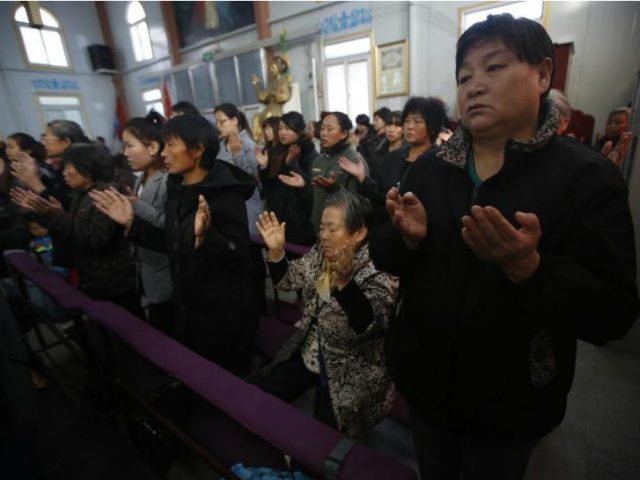In the lead-up to a major summit on religion, the Chinese Communist party is preparing intensified restrictions on Christian churches, according to the Party’s official newspaper on religious issues, Zhongguo Mingzu Bao.
This latest announcement follows on a series of government measures meant to intimidate Chinese Christians, such as arbitrary detention of Christian clergy and the closing of churches.
According to a Reuters report, under President Xi Jinping, China is conducting the worst domestic crackdown on human rights in two decades and much of this is against Christians. Nearly 1,000 rights activists were detained last year alone—almost as many as in the previous two years combined.
In late August, police arrested China’s most prominent Christian lawyer, Zhang Kai, who defended and gave legal counsel to a number of Christian churches throughout the country, especially against the government’s cross-removal campaign.
When Zhang’s father approached the authorities in early October to request information on his son’s detention, he was told that Zhang is a “threat to national security” and that his whereabouts are a state secret.
On September 20, the pastor of a Christian house church in China’s eastern Anhui province, Lü Jiangyang, was taken by authorities under the charge of having engaged in “cult activities” and for contact with overseas organizations. He was released after 15 days, but the message to other clergy is clear: their presence is tolerated but they can be removed at any time for any reason.
Lü, in fact, had previously been detained in July 2015 for holding a church summer camp for elementary and middle school students.
A recent article in Zhongguo Mingzu Bao, declared that Xi is “serious” on religion, mentioning increased controls on churches, clergy and dioceses.
The article suggested that Xi is endeavoring to minimize foreign influence on Chinese institutions, including churches, saying that all religions should be managed by religious organizations from within China. “There is no need for certain groups and individuals outside China to worry about this,” it said.
“It’s obvious that control on religions is to be tightened,” said a priest, who only identified himself as Father Peter. “It was theory and slogans in the past. Now it becomes a real game to play.”
The article quoted from Xi’s address at the central United Front Work Department meeting earlier this year, where he declared that all religions must adapt to socialist policy, calling this “a common principle for all religions to comply with” since China became Communist in 1949.
The Chinese government has set up internal “patriotic associations” for all five recognized religions—Buddhism, Catholicism, Daoism, Islam, and Protestantism—in an effort to keep control over religion within China.
China’s policies toward organized religion have led to an ongoing state of tension between the Chinese government and the Vatican, especially where China has sought to oversee the appointment of bishops and set the administrative boundaries of Catholic dioceses.
In September, the United Front Work Department, the government body that oversees religion, announced new regulations that forbid foreign involvement in China’s religious institutions as well as banning Communist party members from participating in religious activities.
Follow Thomas D. Williams on Twitter @tdwilliamsrome.

COMMENTS
Please let us know if you're having issues with commenting.